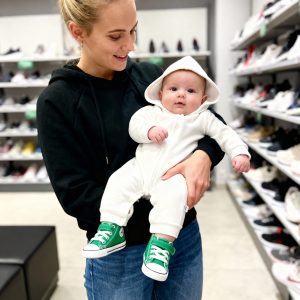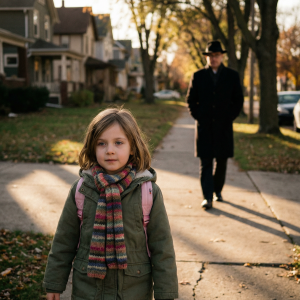The scorching Phoenix heat created waves across the empty boulevard as evening approached. Traffic moved steadily past, drivers enclosed in their climate-controlled vehicles, oblivious to the struggles unfolding just beyond their windows.
Along the cracked sidewalk, a woman in her late twenties pressed forward unsteadily, gripping a weathered backpack against her body like a lifeline. Sarah Martinez had been surviving on the streets for months, her three-year-old son Diego and daughter Isabella clinging desperately to her worn jacket.
Her knees gave way without warning. Sarah crumpled onto the hot pavement with barely a sound, her breathing labored and vision fading. Diego shook her shoulder frantically while Isabella’s frightened sobs filled the air. Pedestrians noticed—some paused, others glanced quickly away—but most continued walking, choosing not to see the crisis unfolding before them.
Then a pristine white luxury sedan pulled alongside the curb. The driver’s door opened, revealing a distinguished woman in her mid-forties—Victoria Chen, tech mogul and venture capitalist whose face regularly appeared on financial news programs. She’d been heading to an important investor dinner when the sight of two terrified children hovering over their unconscious mother stopped her cold.
Victoria rushed over immediately, kneeling on the rough concrete without concern for her expensive suit. “Can you hear me?” she called out, checking for signs of consciousness. Sarah’s pulse was weak but steady beneath her fingertips.
Sarah’s lips moved almost inaudibly: “Help… my children…” before she drifted back into unconsciousness.
Victoria immediately called emergency services, speaking with calm authority despite the urgency. While waiting for help to arrive, she turned her attention to the frightened children. They instinctively moved closer to her, somehow recognizing safety in her presence. “Everything will be alright,” she assured them in a voice that surprised her with its tenderness. “Your mama is strong. I’m going to make sure you’re both safe.”
The ambulance arrived within minutes. As paramedics carefully loaded Sarah onto a gurney, Victoria firmly insisted the children accompany their mother, despite some initial resistance from the medical team. For someone accustomed to managing billion-dollar acquisitions, this moment of human vulnerability felt more significant than any boardroom victory.
Hospital tests revealed the devastating truth: acute malnutrition, severe dehydration, and complete physical exhaustion. Sarah would survive, but her road to recovery required more than medical treatment—it demanded stability and support.
Victoria stayed with Diego and Isabella in the hospital corridor, purchasing snacks from the cafeteria and patiently helping them eat. She found herself unexpectedly grounded by their simple needs, feeling more purposeful than she had during years of high-stakes negotiations.
When Sarah finally regained consciousness late that evening, her first desperate question was: “Where are my babies?”
A doctor reassured her they were safe, and moments later Victoria appeared in the doorway, Diego’s small hand clasped in hers while Isabella dozed peacefully in her arms. Sarah’s eyes brimmed with tears of relief.
“I don’t understand… who are you?” Sarah asked, her voice barely above a whisper.
“Victoria Chen,” came the gentle reply. “I was driving past when you collapsed. The important thing is that you’re going to be okay now.”
Overwhelming gratitude mixed with embarrassment crossed Sarah’s face. “I never expected anyone would care enough to stop.”
Throughout the following week, Victoria became a regular presence at the hospital. She coordinated with medical staff, brought small gifts for the children, and ensured the family never felt abandoned. Gradually, Sarah shared her story—no relatives to turn to, no support system, overcrowded shelters, vanished opportunities, each day a battle for basic survival.
Victoria listened without judgment, deeply affected by what she heard. Her own professional challenges suddenly seemed trivial compared to Sarah’s daily fight against homelessness, hunger, and desperation.
One quiet afternoon, as sunlight streamed through the hospital window, Sarah looked directly at Victoria. “I’m not looking for handouts,” she said with quiet determination. “All I need is an opportunity—employment, housing. I can handle everything else from there.”
Those words resonated powerfully with Victoria. She’d donated millions to various charitable causes over the years, but this personal connection felt more meaningful than any anonymous contribution or celebrity fundraising event.
Upon Sarah’s discharge, Victoria offered her family temporary use of a furnished corporate apartment, typically reserved for out-of-town clients. Sarah initially hesitated, worried about appearing dependent or accepting pity. But facing no alternatives, she finally accepted the offer.
The apartment felt miraculous to them all. Hot showers, clean beds, a refrigerator stocked with nutritious food. Diego and Isabella’s delighted laughter bounced off the walls as they explored their new space, finally free from constant worry about their next meal.
Victoria’s assistance continued beyond housing. She arranged an interview at one of her portfolio companies. Sarah, who had worked in customer service before her circumstances deteriorated, impressed the hiring team with her intelligence and unwavering determination. She was offered a position within days.
Slowly but steadily, Sarah reconstructed her life. Each morning brought the routine of preparing the children for daycare before heading to her new job with renewed confidence. Evenings were filled with home-cooked meals, bedtime stories, and the growing certainty that their future held promise. Victoria remained a consistent presence—not as a superior expecting gratitude, but as a genuine friend who treasured their resilience.
Seasons changed. One evening, Victoria arrived carrying containers of Thai food, their established tradition. Sarah welcomed her with a warm smile, her hair loose around her shoulders, confidence radiating from her posture. The children rushed to greet Victoria with enthusiastic hugs.
“You’ve already done more than enough for us,” Sarah said quietly once Diego and Isabella were occupied with their dinner.
“I realize that,” Victoria responded, holding her gaze. “But meeting your family changed my perspective on what truly matters.”
Their friendship had evolved beyond circumstances—it was built on mutual respect and shared understanding. Sarah’s strength inspired Victoria; Victoria’s compassion provided Sarah with stability. What started as a random encounter on a Phoenix street had become the foundation for something neither woman could have imagined.
Years passed, and Sarah’s transformation became legendary in their circle. Diego and Isabella thrived in their secure environment, surrounded by love and opportunity. Sarah advanced professionally while maintaining her dignity and independence. Victoria, the successful entrepreneur who had once measured everything in financial terms, discovered something more valuable than wealth: the profound impact of truly seeing someone’s humanity and choosing to respond with compassion.
This wasn’t a fairy tale with unrealistic outcomes, but something more powerful—a real story demonstrating how one moment of courage can alter multiple lives forever. Sometimes the most extraordinary transformations begin with the simplest decision to care.
Note: This narrative draws inspiration from real experiences shared by our community members and has been crafted by professional storytellers. Any similarity to specific individuals or places is entirely coincidental. All accompanying visuals serve illustrative purposes only.





